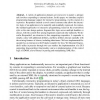Free Online Productivity Tools
i2Speak
i2Symbol
i2OCR
iTex2Img
iWeb2Print
iWeb2Shot
i2Type
iPdf2Split
iPdf2Merge
i2Bopomofo
i2Arabic
i2Style
i2Image
i2PDF
iLatex2Rtf
Sci2ools
99
Voted
ECOOP
2006
Springer
2006
Springer
Responders: Language Support for Interactive Applications
A variety of application domains are interactive in nature: a primary task involves responding to external actions. In this paper, we introduce explicit programming language support for interactive programming, via the concept of a responder. Responders include a novel control construct that allows the interactive logic of an application to be naturally and modularly expressed. In contrast, the standard approaches to interactive programming, based on the event-driven style or the state design pattern, fragment this logic across multiple handlers or classes, with the control flow among fragments expressed only indirectly. We describe ResponderJ, an extension to Java supporting responders. A responder is simply a class with additional abilities, and these abilities interact naturally with the existing features of classes, including inheritance. We have implemented ResponderJ as an extension to the Polyglot compiler for Java. We illustrate ResponderJ's utility in practice through two...
ECOOP 2006 | Explicit Programming Language | Interactive Programming | Java Supporting Responders | Programming Languages |
Related Content
| Added | 22 Aug 2010 |
| Updated | 22 Aug 2010 |
| Type | Conference |
| Year | 2006 |
| Where | ECOOP |
| Authors | Brian Chin, Todd D. Millstein |
Comments (0)

